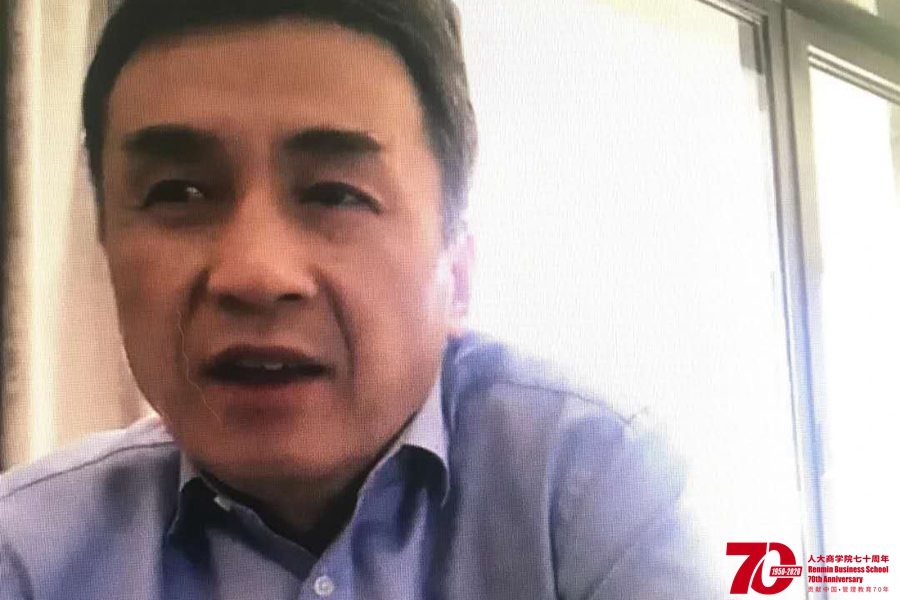Time:2020-09-27
MAO Jiye, dean of Business School, Renmin University of China (RMBS) delivered a speech on the Social Entrepreneurship and Social Innovation Online Forum as follows.

Distinguished guests, ladies and gentlemen,
Good morning to all participants, regardless of where you are. On behalf the local organizer and Renmin Business School, I would like to extend my warmest welcome and appreciation to all of you.
Thank you so much for your participation in this important event, and your support to us. As many of you know this is the first time that our school is organizing such a conference on this important theme, social entrepreneurship. It is so new to us, that I would have to consider this event to us is also social entrepreneurship and social innovation, so to speak. With your support, I am certain that there will be many to follow.
Personally, I’m honored and delighted to help kick-off this full day program.
To make such an event happen, it takes the tireless effort of many, as you might expect. I would like thank all who have been involved in the planning and actual work of organizing, coordinating, and supporting. Without your dedication, this conference would not have happened.
First and foremost, I would like to thank all speakers and presenters. Thank you so much for your sharing of your thoughts and ideas through this platform.
In particular, I would like to thank Professor Yunus who will speak to us today via pre-recorded video. I have fond memories of his first visit to Renmin University on February 25, 2017, about 3 and half years ago, to attend the launching ceremony of our Yunus center for social enterprises.
I remember how he patiently explained to us the definition of social enterprises, including all profit should be reinvested instead of being taken back as dividend.
This visit was instrumental to the development of social entreneurship at Renmin business school. Prior to this most of us had only heard about Professor Yunus’ endeavor and barely had much understanding of social entrepreneurship. Though we admired him but hardly thought of getting involved into this social movement. None of us had done any work in this area, neither research nor services.
Three and half years later, I proudly report back to you that we have a strong team of social entrepreneurship researchers, with over a dozen colleagues and graduate students in a school with 130 faculty. The number is significant enough in itself but even more important is what they have achieved.
As far as I know, they have published two monographs on social entrepreneurship, dozens of teaching cases, and research papers on the subject. My colleagues also worked with the community in China to help certify social enterprises, providing advice to social enterprises.
It is amazing Professor Yunus’ visit has had such a big impact. It is also amazing so much can take place in three and half years. If we can achieve this much in three and half years, it gives us confidence and inspiration to do even more in the future.
We are planning to put more resources to advance the cause of social enterprecises, such as providing educational programs on leadership and business administration for those in social entrepreneurship and social innovation.
Thanks to the past forty years of reform and open up major social problems and sustainability problems remain and more visible. Despite of the major social progress and economic development that have taken place in China, the country remains a developing country.
Today’s world is far from being perfect, and the covid-19 pandemic has amplified many social problems in magnitude and worsened the hardship for many less fortunate. The result is devastating and sometimes life threatening. It is therefore, thus the need for growing social enterprises is as strong as ever. If you look at the horizon and variety of organizations, typically, on the right we have capitalism, which reliantly pursues profitability for shareholders. On the left you have pure welfare organizations, which are faced with resource constraints and the lack of resource as they often run into sustainability problems. It is clear that we need to have a third alternative in the middle.
However, as we have learned in the strategy class of MBA program, the middle of the road is slippery, as one can easily slide to one of the two extreme sides. Therefore, all research, conceptual, theoretical, or empirical exploration, is needed. Involvement in the certification and education by researchers with theoretical background are important.
Ideas can be clearer through discussion, research and debate. It is therefore conferences like this are important. That is we why need to spend our time today for this forum.
Without further due, I would like to wish this forum a complete success, and everyone a pleasant and rewarding experience day with us. Thank you very much for being with us.
RMBS made the Top-50 list of MBA,
EMBA and EE programs——The Financial Times
@Business School, Renmin University of China 京ICP备05066828号-1